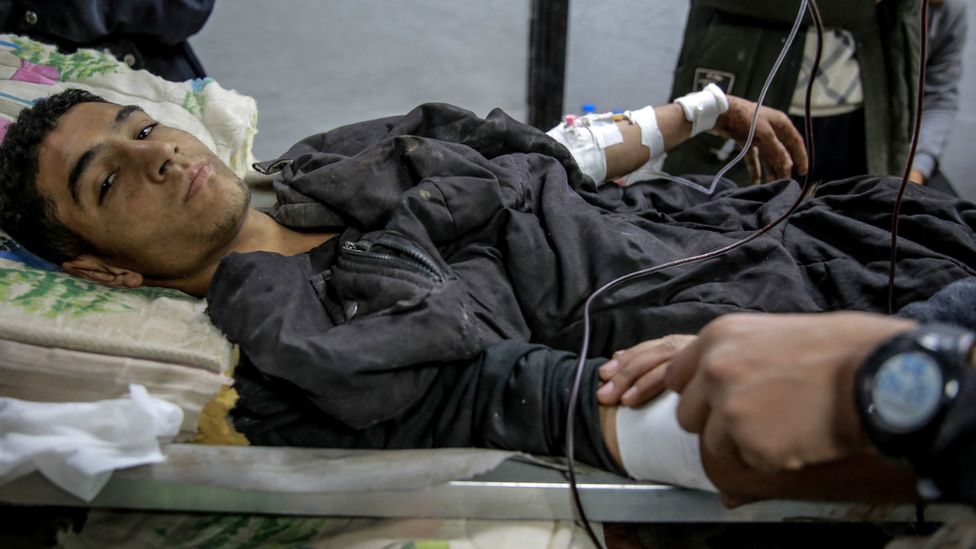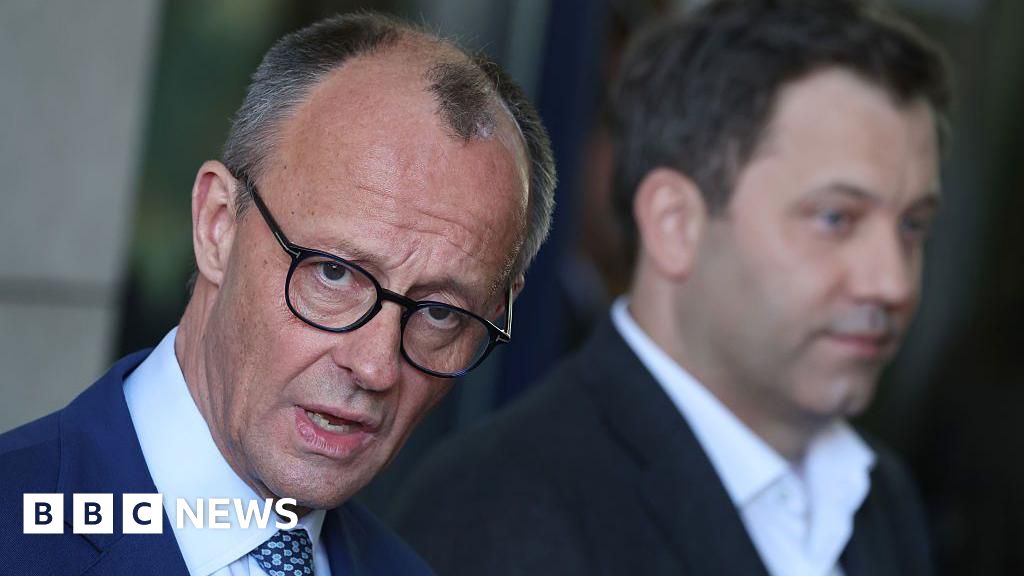ARTICLE AD BOX

In addition to those killed as crowds rushed around lorries on Thursday morning - 760 people were injured, the Hamas-run health ministry said.
After the events at al-Rashid Street in Gaza, in which more than 100 people were reported killed after a rush on an aid convoy, the international community is under pressure to tackle the growing crisis of hunger in the territory, as Fergal Keane reports from Jerusalem.
They die in all kinds of places and ways. Broken under the rubble of their homes, blasted by explosives, punctured by high velocity bullets, cut open by flying shards of metal.
And now - as the war enters its fifth month - death from hunger has come to haunt Gaza.
It is essential to know the when, what and how of the tragedy at al-Rashid Street.
Although the precise facts require an independent investigation of a kind not likely in Gaza under current conditions, that should not distract from trying to answer why people risked their lives to gather in the pre-dawn darkness in the middle of a war zone.
The refugees were there because they were desperate to feed their families. They died by bullets and trampling - we do not yet know in what proportion - simply because they wanted to live. That is a cruel irony.
Of the population in Gaza 85% is now displaced.
Image source, EPA
Image caption,A young girl holds a copy of the Quran at the site of the destroyed Al Bokhari mosque following an Israeli airstrike in Deir Al Balah on Saturday
Eighty-five per cent of the population of Gaza is now displaced. The war has dismantled all normal economic activity and food supplies. Water and electricity supplies have been disrupted. Hospitals struggle without adequate medicine or power.
For the last week the UN - citing concerns over security - has said it is unable to deliver aid to northern Gaza. These are fundamental facts to bear in mind when trying to understand the tragedy.
From the outset the international community - expressed in public statements - has regarded Israel as having the primary responsibility for ensuring aid can be delivered safely.
But, after months of war there is no sign of what the UN calls "an enabling environment" in which large volumes of aid can be delivered to those who need it.
It is not as if there has been absence of evidence of a mounting humanitarian crisis. Witness the statements made by the UN over several months.
"We are already seeing a cascading collapse in water, sewage, and sanitation services, telecoms, food shortages, and healthcare," the UN's Human Rights office reported on 15 November.
Image source, EPA
Image caption,Displaced Palestinian children hold empty pots as they line up to receive food aid provided by a Palestinian youth group, at Rafah refugee camp
On 2 December, the Office for the Co-ordination of Humanitarian Affairs reported: "UN humanitarians on Monday said that aid teams had only 'extremely limited' and access to the north was "now entirely blocked."
Twelve days later the UN Security Council adopted Resolution 2720 calling on "the parties to the conflict to allow, facilitate and enable the immediate, safe and unhindered delivery of humanitarian assistance at scale directly to Palestinian civilians throughout that territory."
On 26 January, the International Court of Justice (ICJ) required Israel "take immediate and effective measures to enable the provision of urgently needed basic services and humanitarian assistance."
By 9 February, director of the UN Relief and Welfare Agency (UNRWA) Phillipe Lazzarini was accusing Israel of blocking food for 1.1 million Palestinians in Gaza.
According to the UN, 500 lorries of aid are required each day. The daily average has been 90.
The aid falling by parachute from the skies in recent days is welcomed on the ground, but it is also a symbol of the failure of the aid effort.
There are roads leading into Gaza from Israel and Egypt along which lorries carrying huge amounts of aid could travel - if those roads were safe.
Image source, Reuters
Image caption,Members of the Jordanian Armed Forces air drop aid parcels along the Gaza coast, in co-operation with Egypt, Qatar, France and the UAE
The continuing war, and the chaotic conditions it has spawned, mean many lorry drivers will not risk their lives.
Civilians looting aid, and criminal gangs stealing aid to sell, are part of what one UN official termed the "Mogadishu-like" conditions that may be developing - a reference to the chaos that enveloped the Somalian capital during the civil conflict of the early 1990s.
The Hamas-run police force in Gaza is unwilling to escort aid convoys because its members reportedly fear being shot by the Israelis.
As for Hamas's leaders, having provoked this war they have vanished and are now fighting to survive in the tunnels and ruins of Gaza.
Image source, EPA
Image caption,A large screen at the National Library of Israel in Jerusalem projects Israeli victims of the 7 October attack and the soldiers who were killed in the subsequent fighting in Gaza
Israel says it is facilitating aid delivery and that, for example, there were three escorted deliveries on the nights prior to the tragedy at al-Rashid street. It has blamed the UN saying aid is stacked up inside the northern border and the UN hasn't "turned up" to distribute the supplies.
In the wake of the allegations UNRWA sacked 12 employees accused of either being involved in the 7 October attacks in Israel or helping in the detention of hostages.
Israel's Defence Minister Yoav Gllant said the IDF would no longer deal with the agency. "UNRWA has lost legitimacy," he said, "and can no longer function as a UN body."
Image source, EPA
Image caption,Displaced Palestinians at Rafah refugee camp, near the border with Egypt
At the beginning of the conflict, days after the Hamas massacre of more than 1,200 Israeli civilians and the kidnapping of 250 more into Gaza, Mr Gallant ordered a complete blockade of the Gaza Strip.
"There will be no electricity, no food, no fuel, everything is closed… We are fighting human animals and we are acting accordingly," he said.
That position changed under US pressure with President Joe Biden announcing a deal on 19 October under which Israel and Egypt allowed aid into Gaza.
Some supplies began to flow but there were still reports of growing hunger.
There were repeated entreaties from Western politicians including UK Foreign Secretary Lord Cameron.
On 9 January, he said he was worried Israel had "taken action that might be in breach of international law" - adding he wanted Israel to restore water supplies to Gaza.
A month later - on 12 February - he told the UK's House of Lords that Israel had to make sure food, water and shelter were available to people in Gaza "because if they don't do that, that would be a breach of international humanitarian law".
In the wake of al-Rashid Street he called for an urgent investigation. "This must not happen again," he said.
But the evidence from many civilians in Gaza is they live in constant fear of violent death and - increasingly - starvation.
In time the world will ask itself why the UN Security Council, comprising the most powerful nations on earth, did not ensure the delivery of life-saving aid to hundreds of thousands of desperate people in Gaza.
This after nearly eight decades of UN humanitarian operations around the world. There is no shortage of experience or resources.
Addressing the Security Council a week before al-Rashid street incident, secretary general of aid organisation Medecins Sans Frontieres Christopher Lockyear spoke of a situation where "the laws and the principles we collectively depend on to enable humanitarian assistance are now eroded to the point of becoming meaningless… the humanitarian response in Gaza today is an illusion."
It is still too early to speak of the tragic events of 29 February as a turning point.
But, the deaths of so many in such terrible circumstances have added to the growing pressure for a ceasefire deal that would allow food to reach the hungry.
The coming days will tell if those hopes can be realised.

 1 year ago
85
1 year ago
85








 English (US) ·
English (US) ·